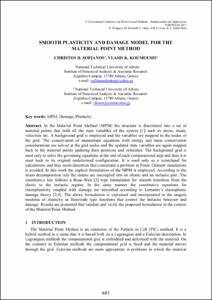Mostra el registre d'ítem simple
Smooth plasticity and damage model for the material point method
| dc.contributor.author | Sofianos, Christos D. |
| dc.contributor.author | Koumousis, Vlasis K. |
| dc.date.accessioned | 2020-05-13T14:54:40Z |
| dc.date.available | 2020-05-13T14:54:40Z |
| dc.date.issued | 2017 |
| dc.identifier.isbn | 978-84-946909-7-6 |
| dc.identifier.uri | http://hdl.handle.net/2117/187416 |
| dc.description.abstract | In the Material Point Method (MPM) the structure is discretized into a set of material points that hold all the state variables of the system [1] such as stress, strain, velocities etc. A background grid is employed and the variables are mapped to the nodes of the grid. The conservation of momentum equations with energy and mass conservation considerations are solved at the grid nodes and the updated state variables are again mapped back to the material points updating their positions and velocities. The background grid is used only to solve the governing equations at the end of each computational step and then it is reset back to its original undeformed configuration. It is used only as a scratchpad for calculations and thus mesh distortion that constitutes a problem in Finite Element simulations is avoided. In this work the explicit formulation of the MPM is employed. According to the strain decomposition rule the strains are uncoupled into an elastic and an inelastic part. The constitutive law follows a Bouc-Wen [2] type formulation for smooth transition from the elastic to the inelastic regime. In the same manner the constitutive equations for elastoplasticity coupled with damage are smoothed according to Lemaitre’s elastoplastic damage theory [3,4]. The above formulation is expressed and incorporated in the tangent modulus of elasticity as Heaviside type functions that control the inelastic behavior and damage. Results are presented that validate and verify the proposed formulation in the context of the Material Point Method. |
| dc.format.extent | 8 p. |
| dc.language.iso | eng |
| dc.publisher | CIMNE |
| dc.subject | Àrees temàtiques de la UPC::Matemàtiques i estadística::Anàlisi numèrica::Mètodes en elements finits |
| dc.subject.lcsh | Finite element method |
| dc.subject.lcsh | Computational methods in mechanics |
| dc.subject.lcsh | Particle methods (Numerical analysis) |
| dc.subject.other | MPM, Damage, Plasticity. |
| dc.title | Smooth plasticity and damage model for the material point method |
| dc.type | Conference report |
| dc.subject.lemac | Elements finits, Mètode dels |
| dc.rights.access | Open Access |
| local.citation.contributor | PARTICLES V |
| local.citation.publicationName | PARTICLES V : proceedings of the V International Conference on Particle-Based Methods : fundamentals and applications |
| local.citation.startingPage | 683 |
| local.citation.endingPage | 690 |


